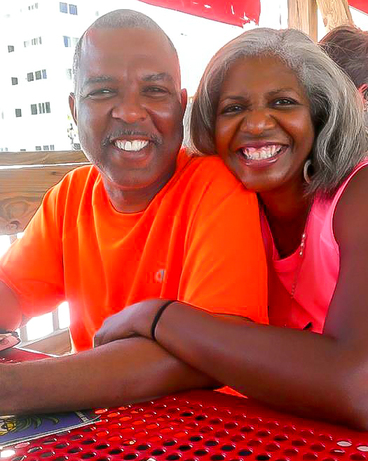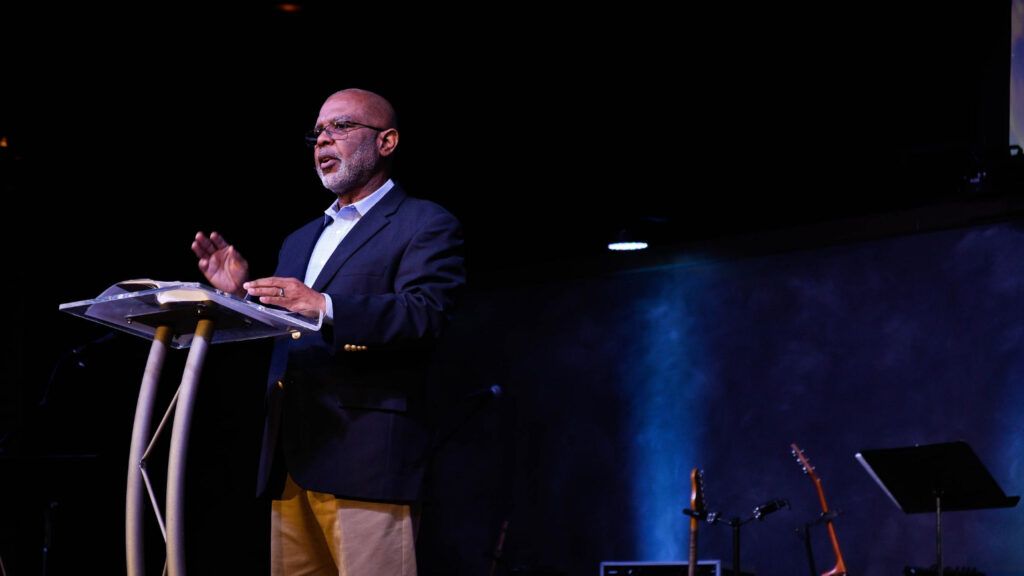Pastor Derrick Shields of Christ Community Church in Columbus, Georgia, sums up his multiracial church’s formula for success in a single sentence: “One of our core values is unity in diversity.”
The roughly 900-member Free Methodist congregation was founded in 1997 with the express purpose of bridging Columbus’ Black-white divide. The church is located next to the former tracks (now a bicycle path) of the Norfolk Southern Railroad, the historic boundary between the white and Black sides of Columbus. The choice of location was deliberate.
“If we were located in a white suburb, we would never be diverse,” says founding pastor Keith Cowart, who started the church with his wife and three other couples after encountering racism at a previous church he led. “So, we located in the city, right on the railroad tracks.” Cowart was elected a Free Methodist bishop in 2018. Shields succeeded him as pastor.
Christ Community is three-quarters white in a city roughly evenly divided between white and Black. That’s a notable level of diversity in a region of Georgia with a history of Ku Klux Klan activity and battles over school desegregation.
Cowart, who is white, grew up in a segregated town in southwest Georgia. When public schools were forced to integrate, most of his friends transferred to all-white private schools. Cowart, whose parents worked in public education, stayed in public school and made friends with Black students—though, he points out, those friends never came to play at his house.
After becoming a pastor, Cowart was called to a Methodist church in Lumber City, Georgia, where members forbade him from inviting local Black children to use the church basketball court. Cowart left and later founded Christ Community in hopes that he could bridge such divides.
The process wasn’t easy. “We have to acknowledge that the church in America, the white church in America, has largely conformed to a culture that supports white privilege and even white supremacy, as opposed to being a counter-cultural witness to the gospel,” Cowart said. “There are things I can’t see of myself, I can only see through the eyes of a Black person.”
After a few years of largely unsuccessful outreach in Columbus’ Black community, Cowart realized he would have to do church in a different way. The fledgling congregation committed to a week of prayer “to help us break through,” he says. He began inviting Black members into leadership, made sure Black people were on stage during worship and widened the music mix to incorporate styles more familiar to Black members.
“When an African-American walks in and everyone who has a microphone is white and no one on stage is Black, it says, ‘We’re a white church,’” Cowart says. “When they see diversity on stage and on your staff and your board they think, ‘Okay, these folks are serious and it feels like our church, not their church.’”

Andrea.
Shields was one of those African-Americans who walked into Christ Community with his wife and three children 15 years ago. Working in real estate after retiring from a 20-year Army career, he was seeking to deepen his faith after reading Rick Warren’s The Purpose Driven Life. He and Cowart became friends, and Cowart mentored Shields as he pursued a call to ministry. After Cowart left the church to become a bishop, Shields was called to succeed him.
Shields said he and his wife, Andrea, were initially drawn to Christ Community because Andrea had participated in a Methodist retreat with Cowart and was impressed by his inclusive vision. Shields was soon put in charge of the church’s Celebrate Recovery ministry and later oversaw outreach and mission programs. He and Cowart agreed that the most important factor in diversifying a church is ensuring that members form close personal relationships with people of different backgrounds. At Christ Community that happens in small, diverse home groups that study Scripture, share meals and talk about the ups and downs of life.
Shields said the groups’ diversity helps members deepen their faith. “A trust is developed” when people share personal and spiritual struggles with others who are different, he says. “You have a deeper level than simply with people who are just like you.” That trust is being tested as Christ Community confronts nationwide protests for racial justice. “Is it easier to have this conversation in church? I wish that was the truth,” Shields says. Church members have joined local marches for racial justice and the church plans to form new small groups focused on racial issues.
But Shields said members are discovering they have different understandings of terms such as “Black Lives Matter” and “white privilege.” He admits that conversations can sometimes be difficult “when you already have opinions formed in stone.” Shields says he remains hopeful, guided by “Scripture passages that inspire me.” He cited God’s covenant with Abraham, a promise to bless the entire world through Abraham’s family.
“God is for all people,” Shields says. “I believe the church is the answer. I really do with all my heart…God has a plan and he isn’t in the business of failing.”
For more inspiring stories, subscribe to Guideposts magazine.






